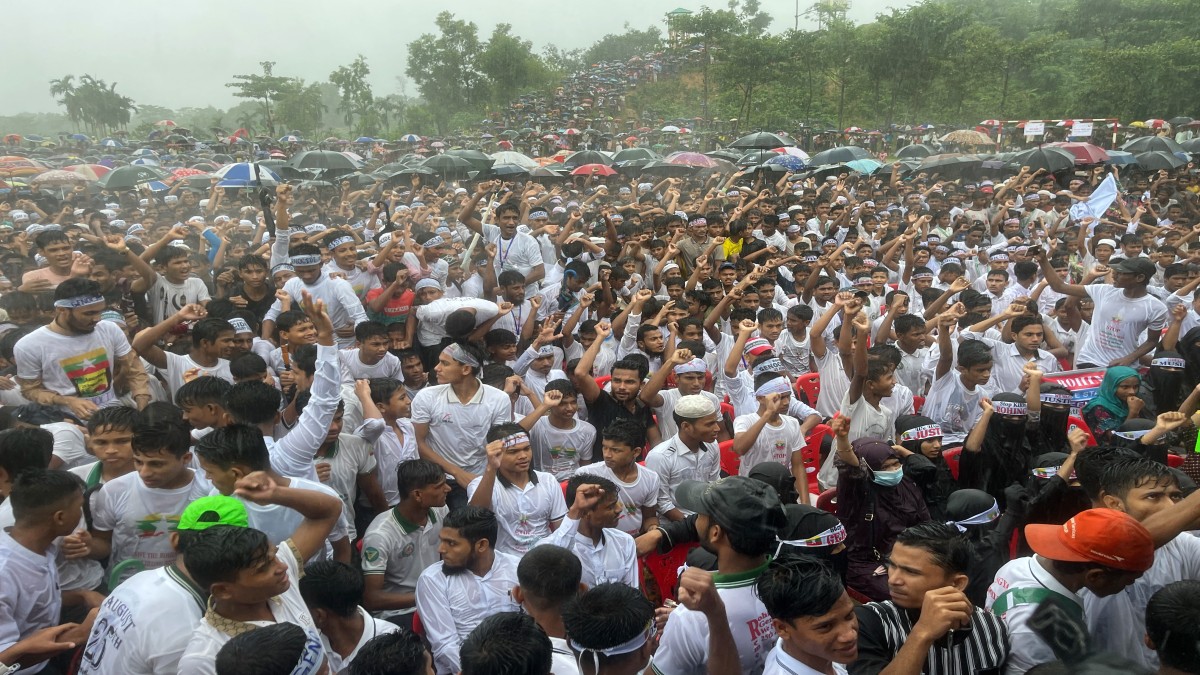The Rohingya crisis, which began with waves of refugees fleeing Myanmar’s Rakhine State in 2017, has been a monumental challenge for Bangladesh. With nearly a million refugees now residing in makeshift camps in Cox’s Bazar, Bangladesh has sought to address the issue at various international forums. At the sidelines of the United Nations General Assembly (UNGA), Bangladesh Chief Adviser Muhammad Yunus reiterated the dangers of treating the Rohingya situation as a national issue, emphasising its regional and global consequences if not properly addressed.
Regional instability and security risks
Yunus appealed to the international community to focus on the Rohingya crisis stems from a growing fear that the problem could extend far beyond Bangladesh’s borders. During the UNGA side event, Yunus warned that without sustained attention, the entire region could face destabilisation. The presence of nearly a million stateless people creates a hotbed for insecurity, with the risk of radicalisation, human trafficking and organised crime. As borders in South and Southeast Asia are porous, any unrest in Bangladesh could ripple across neighbouring countries like India, Myanmar and Thailand.
Yunus highlighted the urgent need for innovative solutions including convening a global conference to revisit international strategies. By framing the crisis as a potential regional destabiliser, Bangladesh is signalling that this is not simply a humanitarian issue but one that could impact regional security.
Overwhelming burden and global responsibility
Since 2017, Bangladesh has been hosting the largest concentration of refugees in the world and its resources have been stretched to the breaking point. Despite the initial surge of international support, funding for the Joint Response Plan (JRP)—which is managed jointly by the UN and Bangladesh—has been steadily declining. Yunus called for a renewed push for political will and resources warning that without sustained financial support the humanitarian crisis will worsen.
Bangladesh has continually stressed that it cannot shoulder the responsibility of hosting such a large refugee population alone. This is why Yunus has repeatedly emphasised the need for international donors to step up their contributions. The US has been a leading contributor, providing over $2.5 billion since 2017, including a new $199 million pledge announced by US Under Secretary of State Uzra Zeya. However, other nations have lagged behind in their financial commitments leaving Bangladesh and its refugee camps to face deteriorating conditions.
Impact Shorts
More ShortsCall for justice and accountability
A key element in Yunus’ appeal is the need for justice and accountability regarding the crimes committed against the Rohingya. The atrocities carried out by Myanmar’s military junta in 2017 have been recognised by many international bodies as genocidal. Yunus stressed that long-term peace and security in the region depend on redressing the wrongs inflicted on the Rohingya.
While the wheels of international justice often turn slowly, Yunus called for immediate action, urging world leaders to support the ongoing investigation and trials at the International Criminal Court. By framing the crisis not just as a humanitarian issue but also as one of human rights and accountability, Bangladesh is appealing to the international community’s moral and legal obligations.
Risk of global neglect and humanitarian collapse
As global attention shifts to other crises, such as the war in Ukraine and conflicts in West Asia, there is a danger that the Rohingya crisis could be forgotten. Yunus’ participation at the UNGA side event was a reminder that the world must not turn away from one of the most persecuted minorities on the planet.
The reality on the ground is stark. Hundreds of thousands of refugees are living in congested camps with inadequate access to basic services like education, healthcare and employment. With a heavy reliance on international aid, which is now dwindling, many refugees are at risk of being pushed into further poverty and exploitation. As the UN has described the Rohingya as “the most persecuted minority in the world,” ignoring their plight could lead to the creation of a permanent underclass of stateless individuals.
Way forward
While short-term aid is critical, Bangladesh has made it clear that sustainable, long-term solutions are essential for resolving the Rohingya crisis. This involves ensuring that refugees are not perpetually dependent on humanitarian aid but are provided with opportunities for education, skills training and legal employment. Zeya pointed out that creating these opportunities will help mitigate the risks of exploitation by criminal elements within the camps. By projecting the crisis as a global problem, Bangladesh is pushing for collective action that addresses not only the immediate humanitarian needs but also the root causes of the conflict in Myanmar. The Rohingya crisis is not just a test of Bangladesh’s resilience but a litmus test for global humanitarian solidarity and justice.


)

)
)
)
)
)
)
)
)



